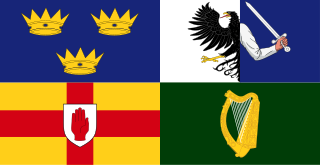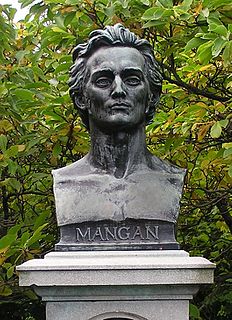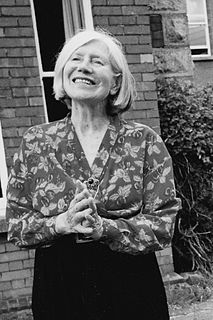Thomas Caulfield Irwin (4 May 1823 - 20 February 1892) was an Irish poet, writer, and classical scholar.

The Irish are a Celtic nation and ethnic group native to the island of Ireland, who share a common Irish ancestry, identity and culture. Ireland has been inhabited for about 12,500 years according to archaeological studies. For most of Ireland's recorded history, the Irish have been primarily a Gaelic people. Anglo-Normans conquered parts of Ireland in the 12th century, while England's 16th/17th-century (re)conquest and colonisation of Ireland brought a large number of English and Lowland Scots people to parts of the island, especially the north. Today, Ireland is made up of the Republic of Ireland and the smaller Northern Ireland. The people of Northern Ireland hold various national identities including British, Irish, Northern Irish or some combination thereof.
Contents
He was born in Warrenpoint, County Down, to a prosperous family. He was educated privately. He travelled to Europe and Africa but later became impoverished through the collapse of family fortunes. He took up journalism in Dublin around 1848. He was highly regarded as a poet by contemporaries. [1]

Warrenpoint is a small town and civil parish in County Down, Northern Ireland. It lies on the northern shore of Carlingford Lough and is separated from the Republic of Ireland by a narrow strait. The town sprang up within the townland of Ringmackilroy. It is locally nicknamed "The Point".

County Down is one of six counties that form Northern Ireland, in the northeast of the island of Ireland. It covers an area of 2,448 km2 and has a population of 531,665. It is also one of the thirty-two traditional counties of Ireland and is within the province of Ulster. It borders County Antrim to the north, the Irish Sea to the east, County Armagh to the west, and County Louth across Carlingford Lough to the southwest.
He was a prolific writer and contributed to the Dublin University Magazine and The Nation, among other publications. He wrote at least one novel and several volumes of poetry. He also carried out translations from classical and European writers. [2]
The Dublin University Magazine was an independent literary cultural and political magazine published in Dublin from 1833 to 1882. It started out as a magazine of political commentary but increasingly became devoted to literature. The magazine was published under the title The Dublin University Magazine: A Literary and Political Journal from January 1833 to December 1877, then under the title The University Magazine: A Literary and Philosophic Review with a new series from 1878 to 1880, and then under the title The University Magazine with a quarterly series from 1880 to 1882.

The Nation was an Irish nationalist weekly newspaper, published in the 19th century. The Nation was printed first at 12 Trinity Street, Dublin from 15 October 1842 until 6 January 1844. The paper was afterwards published at 4 D'Olier Street from 13 July 1844, to 28 July 1848, when the issue for the following day was seized and the paper suppressed. It was published again in Middle Abbey Street on its revival in September 1849.
He died after some years of poverty in Rathmines, Dublin, and is buried in Mount Jerome Cemetery.

Rathmines is an inner suburb on the southside of Dublin, about 3 kilometres south of the city centre. It effectively begins at the south side of the Grand Canal and stretches along the Rathmines Road as far as Rathgar to the south, Ranelagh to the east and Harold's Cross to the west. It is situated in the city's D6 postal district.








